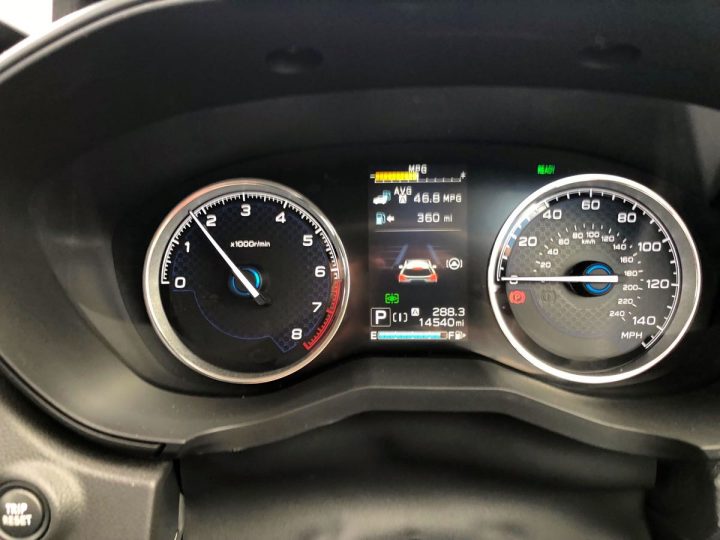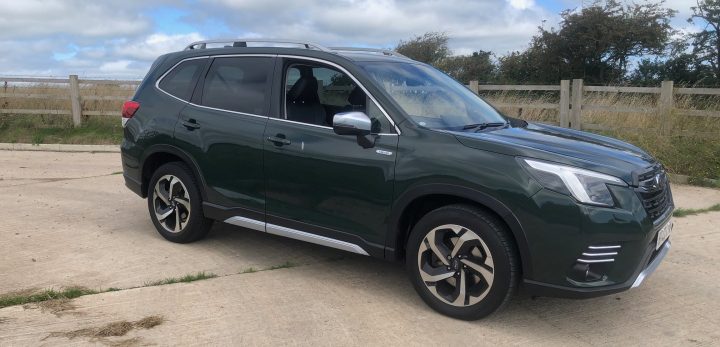If you live in the country, the chance’s you’ll like a dark horse such as the Subaru Forester.
It is an all-time four-wheel-drive model with good ground clearance, carries and tows a lot but it’ll not cost you an arm and leg like most 4WD or SUVs.

The Subaru Forester also comes with something rivals clamour, rarity value. You are unlikely to see as many in the lanes and towns as with competitors, and that creates an air of individuality.
There are three mechanically similar models of the Forester: XE, Sport and Premium, as we tested here, but they differ in elements of trim and cost from £37,895, £39,995 and £40,990.

The latest Forester is a development of the fifth generation which appeared in 2019, some 22 years after the model first appeared as an estate based on the Subaru Impreza and subsequently morphed into an SUV with the third generation. It has a near unique flat-four-cylinder petrol engine similar in design to the mighty Porsche engines and this endows it with tremendous torque and compactness but often meant it could be mechanically noisy in early examples.
Subaru persistence and development however has eradicated most of the noise and modifications to the original CVT Lineatronic transmission has made it an ideal powertrain for the permanent beautifully balanced 4WD system.
The 2022 facelift of the fifth generation Forester came with its 25th anniversary and a very generous package of comfort and dynamic technology along with mechanical improvements to better ride and handling for today’s buyers.

Our Premium had standard enormous sunroof, 18-inch diamond cut alloys and leather seats, which are heated front and back. The changes included on this top range version the standard fitting of EyeSight which uses a camera facing the driver to monitor alertness or distractions together with automatically setting seats and mirrors to the known driver’s preferences, as well as gesture control so you can effectively wave away heat or cold by placing a hand infront of the central display.
Well, I said it was different.
Mechanically, the proven 2.0 litre engine does a good job and is smooth and fairly quiet with welcome assistance from a ‘warm’ electric motor to lift total power output without making it snappy or jerky, just progressive. I have always been a fan of the CVT Lineartronic but it’s smoother than ever now and easily delivers traction to which ever wheel needs it most in any situation and without any tugging or bad manners through bends and you can select different modes depending on the road conditions.

This safe and surefooted progress is particularly good on wet, muddy or snowy roads when a light touch is best to prevent wheelspin or loss of control.
Subaru has revised the coil sprung suspension to make it better absorb bumps without it feeling too soft for a quick trip along twisting lanes or a motorway and with the big, supporting seats inside the occupants are well looked after.
It does not feel as agile as some lighter-weight rivals but you get the impression this will get you to a challenging destination and back again, if you take your time. The ground clearance of 22cms or close to eight inches is useful for many rutted tracks.

Reversing cameras at the back and under the door mirrors give a very good indication of hazards such as posts and kerbs as well as people and the audible sensors have been given a wider field of detection on the new models.
The smoothness of the powertrain matched that of the steering and brakes with a good turning circle, effortless stopping ability and strong parking brake.
Secondary controls were plentiful and also felt reassuring to use with well placed stalks and buttons on the wheelspokes, column and central console.

A decent sized display infront of the driver was not marked in great detail around the usual dials but was clear and could be altered to show different readouts and warnings while the larger central console infotainment was very clear and topped by a power meter which doubled as a reversing screen for the front wheels with the main rear view shown below when in use.
Climate control was straightforward and worked well with lots of vents, quick changing and good thermal range throughout the big cabin. The sunroof was big and the powered windows backed up the settings but driver and his front passenger’s window were one-touch.

Oddments room was really generous for everyone and those behind also had power points as well. A high opening powered tailgate revealed a wide, long and deep loadbed with more small compartments beneath and offset split back seats dropped instantly to give an extended level platform with easy access from the back doors as well.

The seats were really comfortable throughout, with lots of leg, head and shoulder room as well.
There was some body roll on tighter turns but generally the Forester was level riding and always comfortable.

If you don’t want to deal with a bigger and bulky SUV but need the comfort, room and economy of a practical, all-weather refined workhorse, then the Subaru Forester Premium could be your answer.
It really is a case of horses for courses.



